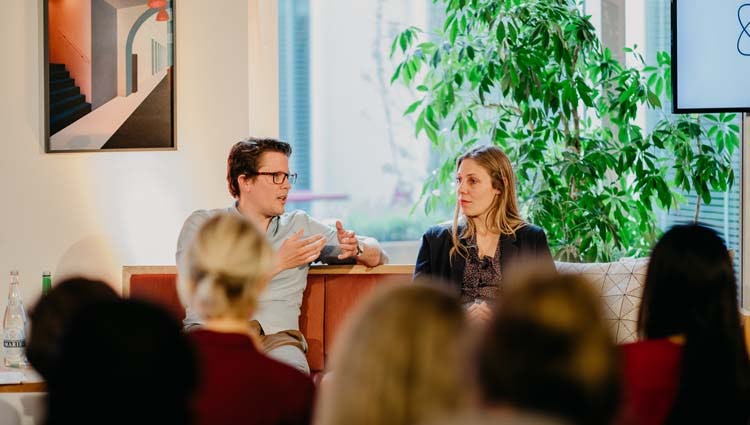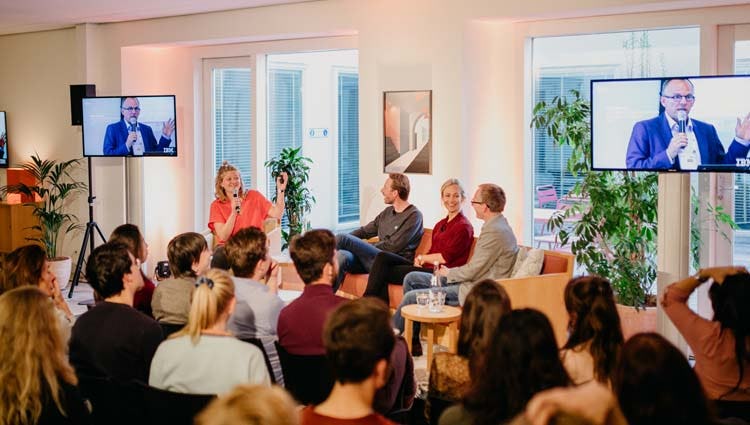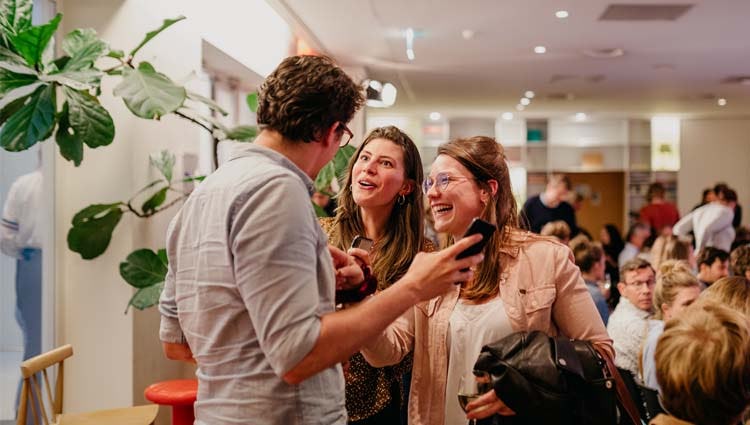
On a global level, around one-third of all food produced is being thrown away. Reasons why this is happening are countless, but there’s one thing anyone can agree on: we have to find a way to deal with the food waste problem. That’s why we welcomed the industry shakers, futurists and environmental pioneers who are paving the way towards a circular and sustainable economy together for our latest edition of Amsterdam Talks Tech on May 7th.
First, let’s put this problem into perspective. On average, the combined amount of food that ends up in the trash globally adds up to around a third of a billion tonnes. It’s an almost unimaginable quantity of food. That’s also why a frequently heard comparison in the industry is the iceberg-effect. You only see the tip of the iceberg, but can’t see just how much of it is under water. That’s what we’re trying to do this evening.
Five inspiring speakers took to the stage as they shared their unique ways of putting an end to this global issue. Ranging from social initiatives to orchestrating a complete make-over of the supply chain, we’ve learnt about some of the most promising ideas we’ve ever heard of. These are the speakers and brands we got to listen to:
- Helen Kranstauber // co-founder & partner at Food Cabinet
- Olaf van der Veen // Zero foodwaste
- Rick Reesen // Innovation Lead & Blockchain Strategy Consultant at IBM
- Freke van Nimwegen // Co-founder Instock
- Joost Rietveld // Managing Director at Too Good To Go in The Netherlands
“We can’t live without food, yet we waste so much”, as Stephanie Bartscht, moderator for the evening, so eloquently put it. It’s true, but combine that with the fact that the availability of food all around us is so high, causes us to appreciate the real value of food even less than we should. A point immediately confirmed by the number of food wasters in the audience – but there is hope. When asked, the audience shared some insightful ideas to reduce food waste. Ranging from putting leftovers in the freezer, to eating your leftovers at lunch or even inviting your friends over to clean out your pantries, the ideas are certainly there.
Changing mindsets
Helen from Food Cabinet picks up from there. Their advertising agency solely for food waste-related projects only works with brands that are actually willing to make a change. Based on the notion that something highly valuable is lost, Food Cabinet strives to make a change by educating people involved all throughout the food chain. By creating campaigns to raise awareness from field to table, Food Cabinet wants to change mindsets through real, social awareness.
A typical example of a Food Cabinet campaign is found in samen tegen voedselverspilling. This large-scale operation focused on showing people the little things they can do at home to prevent food waste. Receiving over a million views on social media, this campaign revealed that it’s a topic that’s becoming more relevant every day. Another initiative called Camp Food Waste also proved wildly successful. A food festival with a great atmosphere where all dishes are made from food that would’ve ended up in the trash otherwise. It’s the ideas like these that show that even the tiniest changes in mindset can make all the difference. Removing the negative stigma around food waste and provoking the system is a wonderful way to encourage change.
worth its weight in food waste
A completely different approach is presented by Olaf from Zero foodwaste. After years of witnessing food waste first-hand, Olaf came up with a system that allows all kinds of hospitality businesses to reduce their waste as much as possible. He used his experience in data optimisation to develop a waste bin that doesn’t just weigh what goes in, but it also uses an AI-powered camera to recognise exactly what goes in. The user simply checks the personalised dashboard, adapts the portions, sales or production method, and you’ve got a system that measurably reduces food waste. The goal set by governments all around the world, is to reduce food waste with 50% by 2030, although that might prove difficult. “there’s hardly anything visible yet, so we need to pick up the pace”, Olaf says. “Tech alone will never solve this problem, we need collaborations in the industry to achieve that”.
breaking the chain
After the break, Rick Reesen from IBM shared some interesting takeaways from the IBM Food Trust. After selling their PC branch, they’ve been diverting their focus towards leveraging technologies such as cloud-based computing, IoT, AI, quantum and blockchain to create solutions for problems in the world. Using the latter, they strive to make the food chain more transparent, offering a different take on the problem. With blockchain, anyone in the food chain can directly look at real-time supply and demand, and look at every little detail from production to product. This allows anyone within the chain to optimise their processes, possibly removing food waste from it altogether.
Freke, one of the co-founders of Instock worked at a local supermarket when they witnessed perfectly fine food being binned firsthand, and came up with the idea to use that food in a restaurant. That restaurant became Instock. Whatever the products were, they’d turn it into a well-balanced meal as long as the food was still good by according to regulations. To practice what they preach, their chefs are fully trained to utilise almost every last bit of product. On top of that, they constantly keep pushing themselves to further increase their impact. One restaurant turned into multiple restaurants, and now they’re training new chefs to spread knowledge and awareness. They’ve even opened a b2b warehouse, making them an official wholesaler in food waste.
“Our story is a conversation starter”, Freke says. “Customers are shocked by what they eat. In the beginning our menu changed everyday, and everyday I went crazy. then we had a weekly menu, now we have a fixed menu. That exposes the core of the problem, because we have such a steady flow of products coming in.”
You start up the app, choose your magic bag, and pick it up. Saving food through an app – that’s the approach of Too Good To Go according to Joost. “Because when you’ve been running a business for years, you know your amounts of waste. Bakers, supermarkets and other food producers fill up the bag, and the rest is history”, he says. In their ideal world, every bit of food is used until absolutely nothing remains, creating a truly circular system.
Three Key takeaways
The night wouldn’t be complete with sharing some key takeaways so people can start making a change themselves. Here’s what the speakers shared:
- Preventing food waste requires commitment, commitment, and a bit more commitment
- Don’t try to be perfect, make small improvements and stick to it (again with the commitment)
- Be your grandma. These people know their sh*t, don’t eat too much, and don’t waste too much.
Share this article
 Read now What's happening at Spaces in week 21
Read now What's happening at Spaces in week 21
 Read now How office design can increase productivity
Read now How office design can increase productivity


